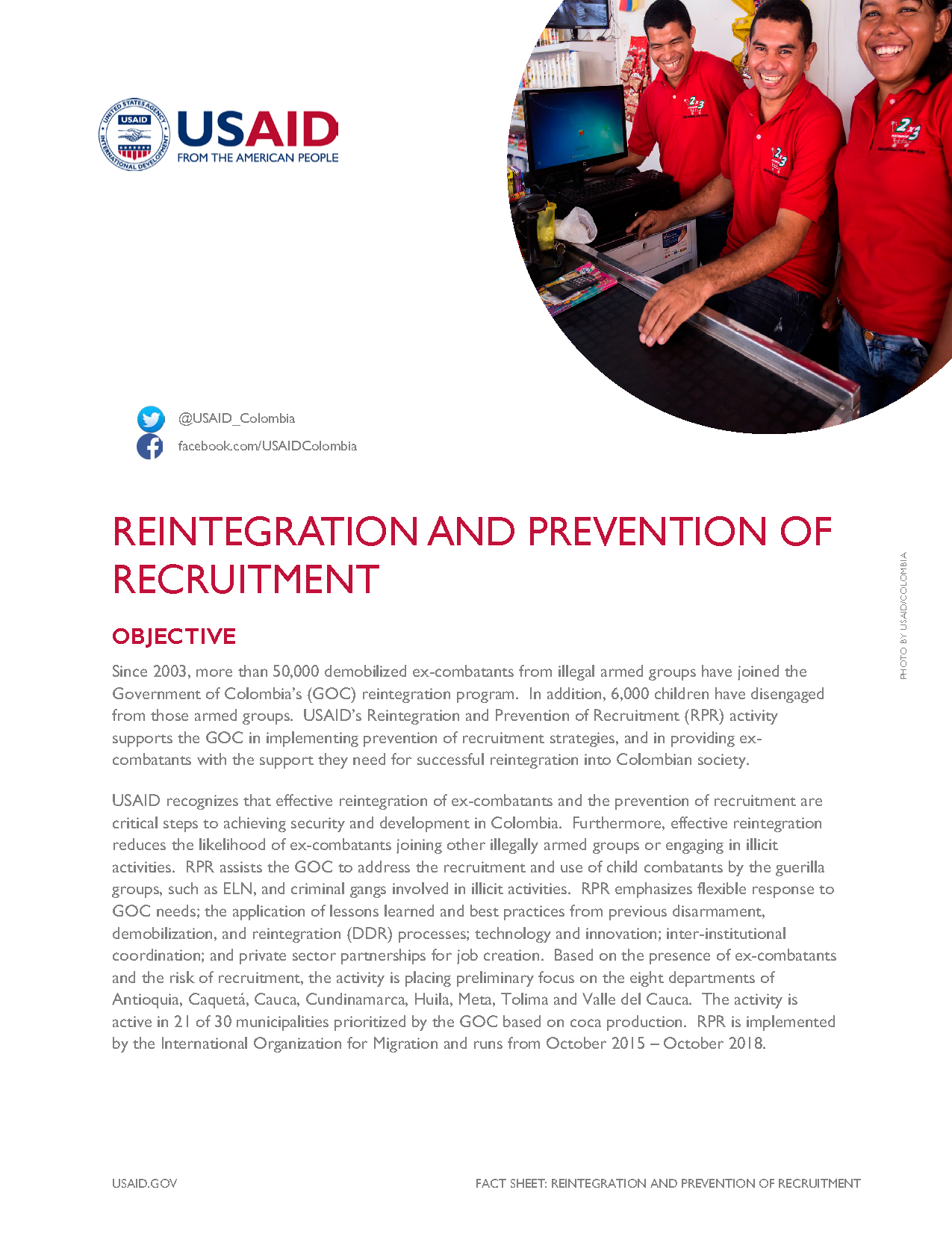Speeches Shim
OBJECTIVE
Since 2003, more than 50,000 demobilized ex-combatants from illegal armed groups have joined the Government of Colombia’s (GOC) reintegration program. In addition, 6,000 children have disengaged from those armed groups. USAID’s Reintegration and Prevention of Recruitment (RPR) activity supports the GOC in implementing prevention of recruitment strategies, and in providing ex-combatants with the support they need for successful reintegration into Colombian society.
USAID recognizes that effective reintegration of ex-combatants and the prevention of recruitment are critical steps to achieving security and development in Colombia. Furthermore, effective reintegration reduces the likelihood of ex-combatants joining other illegally armed groups or engaging in illicit activities. RPR assists the GOC to address the recruitment and use of child combatants by the guerilla groups, such as ELN, and criminal gangs involved in illicit activities. RPR emphasizes flexible response to GOC needs; the application of lessons learned and best practices from previous disarmament, demobilization, and reintegration (DDR) processes; technology and innovation; inter-institutional coordination; and private sector partnerships for job creation. Based on the presence of ex-combatants and the risk of recruitment, the activity is placing preliminary focus on the eight departments of Antioquia, Caquetá, Cauca, Cundinamarca, Huila, Meta, Tolima and Valle del Cauca. The activity is active in 21 of 30 municipalities prioritized by the GOC based on coca production. RPR is implemented by the International Organization for Migration and runs from October 2015 – October 2018.
COMPONENTS
Reintegration
RPR supports GOC efforts to successfully reintegrate individually demobilized ex-combatants into their communities by assisting the GOC in the delivery of social and economic services, and tailoring reintegration needs to the ex-combatant’s needs. For example, elderly ex-combatants who have lived a significant portion of their lives in rural areas face significant challenges in finding sustainable economic opportunities. With USAID support, the Colombian Agency for Reincorporation and Normalization (ARN) implements a tailored economic stabilization program for elderly ex-combatants. These ex-combatants receive agricultural skills training and job placement opportunities in agricultural enterprises. Private sector partnerships such as these provide stable economic opportunities for ex-combatants, greatly reducing recidivism. RPR does not provide technical or material support for the reincorporation of the FARC combatants who have entered the DDR process as a part of the peace accords, but rather supports those that individually demobilize outside of the peace accord process.
Prevention of Recruitment
RPR supports the GOC in the prevention of child recruitment, and in reducing the re-recruitment of ex-combatants. RPR partners with the GOC and civil society to decrease the vulnerability of at-risk youth by fostering cultural and sports activities, which have a powerful influence on those who are at the highest risk for recruitment. These activities give children positive adult role models, who gradually reinforce non-violence, establish peer groups around shared goals, and build self-esteem.
Coordination and Communication
RPR supports the GOC’s inter-institutional coordination at the central and local levels by facilitating dialogue and joint planning on reintegration and prevention. RPR support for information systems enables GOC agencies to register and share data, improving decision-making, monitoring of ex-combatant status, and service provision. The activity also increases access to information on the peace accord and the DDR process through communications to government agencies, communities, ex-combatants, their families, and the public.
RESULTS
- Tracking and monitoring system developed to identify participants at risk of recidivism, allowing the ARN to quickly respond to risks and prevent recidivism. To date, 76 percent of participants in the Reintegration Process continue to live within legality.
- Provided opportunities in technology, culture, sports and education to 11,000 at-risk youth in 30 municipalities, increasing their capacity to withstand recruitment into criminal activities.
- Over 200 children and adolescents have been released by the FARC, and when possible, back into their communities and families, based on a protocol supported by USAID.
- Incentivized 12 private sector companies to invest in reintegration efforts for the first time, and leveraged $1,497,000 from the private sector to support the achievement of USAID reintegration and prevention of recruitment objectives.
- Supported the GOC’s High Council for Post-Conflict in the design of a package of inter-institutional services, implemented by the GOC, for ex-combatants.
- Supported early reintegration programs for adults to facilitate social and economic transition, resulting in approximately 165 jobs for ex-combatants.


Comment
Make a general inquiry or suggest an improvement.